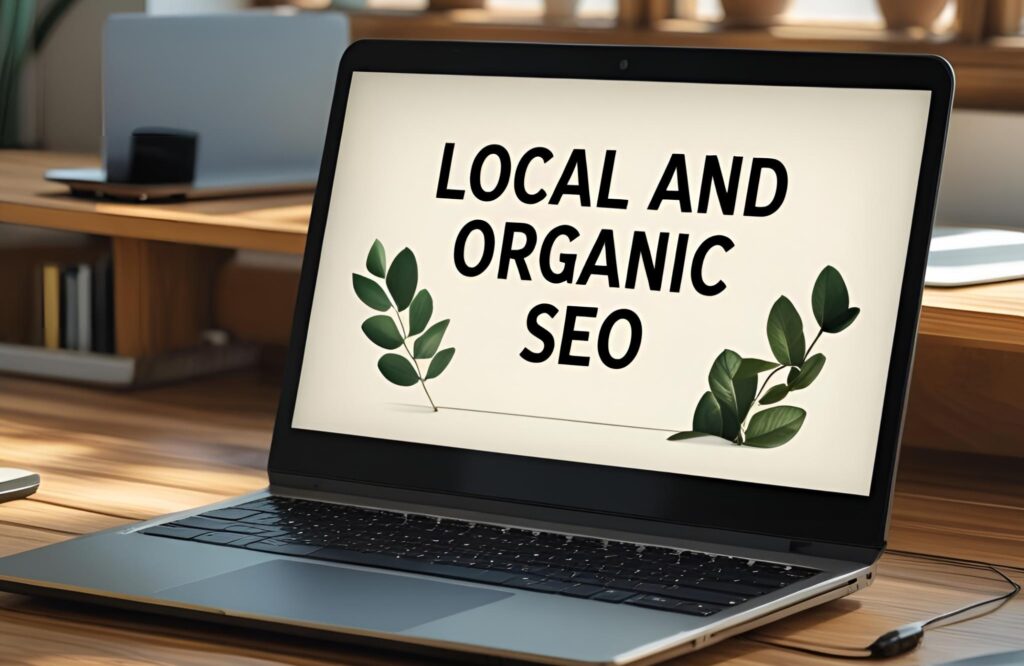Search engine optimization (SEO) is an essential component of digital marketing that helps businesses increase their online visibility. However, with many SEO strategies available, it can be difficult to understand which one is best suited for your goals. Two commonly discussed SEO strategies are local SEO and organic SEO, each with its own set of practices and objectives.
So, what is the difference between local and organic SEO? While both aim to improve your rankings on search engine results pages (SERPs), they do so in distinct ways. Local SEO focuses on optimizing your online presence to attract nearby customers, while organic SEO targets a broader audience and aims for long-term growth. In this guide, we’ll break down the key differences between local and organic SEO, so you can figure out which one is best for your business and how they can work together to help you succeed.
What is Local SEO?
Local SEO is a search engine optimization strategy focused on improving a business’s visibility for searches that include a specific geographic area. This is ideal for businesses with a physical location, such as stores, restaurants, or service providers, who want to connect with customers nearby.
The core elements of local SEO include optimizing your Google My Business (GMB) profile, ensuring that your NAP (Name, Address, Phone Number) is consistent across all online directories, and leveraging customer reviews to improve trust and visibility. Local SEO helps businesses appear in localized search results, such as the Google Local 3-Pack, which showcases the top three businesses in a given location.
Key Local SEO Strategies:
- Claim and Optimize Google My Business: Ensure your GMB profile is fully completed with accurate business information, images, and services.
- NAP Consistency: Make sure your business’s name, address, and phone number are consistent across all directories and online platforms.
- Leverage Local Keywords: Target location-based keywords (e.g., “plumber in Miami”) in your website content and meta tags.
- Encourage Reviews: Positive reviews can improve your rankings and help potential customers find your business more easily.
For businesses that rely on customers in a specific area, local SEO is crucial to connect with those nearby and boost your visibility.
What is Organic SEO?
Organic SEO focuses on improving a website’s visibility in the unpaid search results of search engines like Google. Unlike local SEO, which is geographically targeted, organic SEO aims for broader visibility by ranking for general, non-location-based search terms.
The main strategies for organic SEO include creating high-quality content, building backlinks, and ensuring the website is technically optimized for search engines. Organic SEO is often a long-term approach that requires patience but provides sustainable growth. By optimizing for relevant keywords, businesses can drive a consistent stream of organic traffic.
Key Organic SEO Strategies:
- Keyword Research: Identify high-traffic keywords that align with your business and target audience.
- Content Optimization: Create valuable, engaging content optimized with keywords and relevant information to improve search rankings.
- Backlink Building: Acquire backlinks from authoritative websites to improve your site’s authority and ranking.
- Technical SEO: Focus on improving page speed, mobile optimization, and website structure to enhance user experience and search engine crawlability.
Organic SEO works well for businesses looking to reach a broader audience and build a long-term, credible online presence.
Key Differences Between Local and Organic SEO
When comparing local SEO and organic SEO, businesses need to understand the unique characteristics and advantages of each strategy. Here’s a breakdown of the key differences:
1. Target Audience
- Local SEO: Focuses on users searching for businesses or services within a particular geographic location. It’s especially important for businesses that serve local customers, such as retail stores, law firms, or restaurants.
- Organic SEO: Aims for a broader audience, targeting search queries that are not location-specific. This is ideal for businesses looking to expand their reach beyond a specific geographic area.
2. Ranking Factors
| Local SEO | Organic SEO |
|---|---|
| Google My Business Profile Optimization | Content Quality and Relevance |
| NAP (Name, Address, Phone Number) Consistency | Backlink Authority |
| Customer Reviews and Local Citations | On-Page Optimization (Keyword Usage, Metadata) |
3. Visibility and Impact
- Local SEO: Provides quicker visibility, especially in the Google Local 3-Pack, which showcases the top three businesses in a local search. This is particularly valuable for businesses that rely on foot traffic.
- Organic SEO: Takes longer to show results but offers broader and more sustained visibility on the first page of search results. It’s ideal for businesses targeting a global or national audience.
4. Conversion Rates
- Local SEO: Local searches often have higher intent to convert, as users are typically looking for nearby businesses and services. This can lead to better conversion rates for physical businesses.
- Organic SEO: While organic traffic can be high, conversion rates may be lower initially, as users may still be in the awareness or research phase.
5. Results Speed
- Local SEO: Local SEO often brings faster results, with businesses appearing in local searches shortly after optimizing their GMB and online listings.
- Organic SEO: Requires more time and effort before achieving meaningful rankings, as it involves continuous content creation, link-building, and technical optimization.
6. Cost and ROI
- Local SEO: Typically costs less in terms of financial investment, focusing mainly on optimization and local listings. It offers a high return on investment for small, local businesses.
- Organic SEO: Requires more investment in content, backlinks, and website improvements. However, it provides long-term benefits and can result in a steady stream of organic traffic.
By understanding these key differences, businesses can decide which strategy aligns best with their goals.
Which One Should You Choose for Your Business?
Choosing between local SEO and organic SEO depends on your business model, target audience, and goals.
When to Choose Local SEO:
- Local businesses such as restaurants, service providers, or retail shops that cater to a nearby customer base will benefit most from local SEO.
- If your goal is to attract foot traffic or customers in a specific area, local SEO will help you rank in relevant local search queries quickly.
When to Choose Organic SEO:
- National or international businesses that do not have a specific geographic location or those that want to reach a wider audience should prioritize organic SEO.
- If your business aims to rank for broad search terms and build long-term visibility, organic SEO will help you achieve sustained success.
A Hybrid Approach:
Many businesses, especially those with both local and national audiences, can benefit from combining both local SEO and organic SEO. This dual approach ensures visibility in local searches and attracts broader, more diverse traffic.
How to Implement Local SEO & Organic SEO
When you’re looking to boost your business’s online visibility, Local SEO and Organic SEO each play a crucial role. Local SEO helps you connect with nearby customers, ensuring your business appears in relevant local searches, while Organic SEO aims to give you long-term visibility across broader search results.
By implementing both strategies, you can effectively increase your chances of ranking higher and attracting both local and general traffic. Explore how to get started with Local SEO and Organic SEO so you can make the most of each approach.
Local SEO Implementation:
- Claim and Optimize Your Google My Business: Add your business details, services, and attractive images.
- Ensure NAP Consistency: Update your business details across all directories, including Yelp, Yellow Pages, and other local listings.
- Leverage Local Keywords: Use location-based keywords in your content, such as “digital marketing agency in Connecticut” or “SEO services in Danbury”.
- Encourage Reviews: Positive reviews help your business rank higher in local search results.
Organic SEO Implementation:
- Conduct Keyword Research: Use tools like Google Keyword Planner to identify high-traffic keywords.
- Create Engaging Content: Develop blog posts, articles, and pages optimized with your target keywords.
- Build Backlinks: Gain quality backlinks from authoritative websites to boost your ranking.
- Optimize Your Website’s Performance: Focus on improving page speed, mobile responsiveness, and technical aspects of SEO.
Conclusion
The difference between local and organic SEO lies in the target audience, ranking factors, and visibility goals. Local SEO is ideal for businesses targeting customers within a specific geographic area, while organic SEO provides long-term visibility for businesses aiming to rank for broader search terms. By understanding these differences, you can tailor your SEO strategy to align with your business goals. For many businesses, combining both strategies is the key to maximizing visibility and driving traffic.
At ChitChat Marketing, we specialize in both Local SEO and Organic SEO strategies that help businesses thrive in a competitive online space. Whether you need to optimize your Google My Business profile or create high-quality content to boost organic traffic, we’ve got you covered. Ready to enhance your online presence and drive more traffic to your site? Contact us today to start implementing an SEO strategy that works for your business. Let’s take your brand to the next level through smarter SEO.
FAQs
What is the difference between local SEO and organic SEO?
Local SEO focuses on location-specific searches, while organic SEO targets broader, non-location-based keywords. Local SEO is ideal for businesses with physical locations, while organic SEO helps businesses reach a national or global audience.
What is the difference between local SEO and international SEO?
Local SEO optimizes for local searches, while international SEO targets multiple countries and languages. International SEO involves adapting content for regional preferences, languages, and currencies.
What is the difference between local SEO and general SEO?
Local SEO targets local search terms, while general SEO (organic SEO) focuses on non-location-specific keywords. General SEO requires ongoing efforts to rank for more competitive, broad keywords.
What is the difference between local SEO and on-site SEO?
On-site SEO optimizes your website’s content and structure, while local SEO focuses on location-based queries and business listings. On-site SEO improves the overall user experience, while local SEO ensures visibility in local searches.




